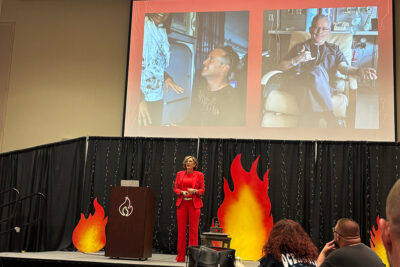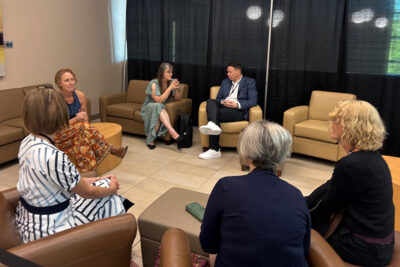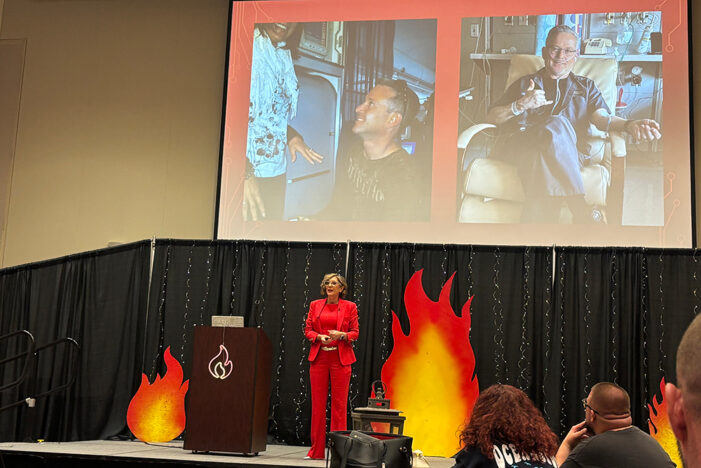Brandon Leuallen, The Business Times

In its inaugural year, the Spark Summit brought national-level insight and hands-on leadership training to Grand Junction without the travel or expense of a big-city business and leadership conference.
Rather than relying on theory, organizers Robert Beaver and Kristin Donahue designed the day as a “working summit,” where business owners, executives and aspiring leaders could get personal with the speakers and find immediate application for the information.
With nationally recognized business consultants, including keynote speakers Carl Lubbe, Susan Frew and Carolyn Strauss leading the way, and a schedule of breakout master classes, the event offered the kind of high-level professional advice and information typically reserved for larger markets.
Here are some of the highlights:
A keynote on conflict and questions
The morning keynote came from Carl Lubbe, founder of Curiosity Coach, who illustrated his point about curiosity with a story from his own family.
He said he did not learn until his mid-twenties that his grandmother, as a child in London during World War II, had been evacuated to the countryside where she visited the home of A.A. Milne, the author of Winnie the Pooh.
Over breakfast one morning with his mother and grandmother, she described seeing the house, the animals, and even the bedroom where Christopher Robin once lived.
Stunned, Lubbe asked why she had never told him before. Her answer was simple: “Because you never asked.”
Lubbe now advises and collaborates with companies like Lululemon and Chick-fil-A, and spoke to the crowd about how leaders need to rethink how they handle tension.
“Everything you want is on the other side of a better question,” he told the audience, highlighting how reframing questions can transform conflict into collaboration.
That lesson became central to his message.
“Average leaders settle for simple answers. Great leaders settle for better questions,” he said.
He urged attendees to see conflict as a process problem rather than a people problem, saying, “Process, not people, are the problem.”
He then offered a simple framework for hard conversations: Acknowledge difficulty, affirm effort, and ask what a win would look like.
“It is neurologically impossible to be curious and angry at the same time,” he added, summing up his approach with the reminder to “feel twice, fix once.”
Personal discussions with speakers and shared audience application
Immediately after the keynote, event host Kristin Donahue directed attendees to the Playground, a roped-off lounge with couches reserved for casual conversations with speakers. Throughout the day, keynote presenters and session leaders rotated through the space, giving participants a chance to sit down with them one-on-one.
Lubbe and local commercial broker Katie Davis were the first to settle in, and others followed as the program continued. Instead of lining up at a microphone to ask a quick question, participants had extended the discussions in person to build on ideas introduced from the stage before the next session.
During the breakout debrief, attendees shared practical takeaways with the rest of the audience that they planned to bring back to work.
One noted how accounting consultant Kelly Johnston’s talk on organizing accounting data and using it properly reminded her how valuable it is to have regular reports to be able to make quality financial decisions. During the session Johnston had given examples of how at times even large organizations fail to do this.
Another said Lubbe’s advice to end every meeting with the question, “Would you mind telling me what you think we just agreed to?” was a small but powerful tool to confirm alignment and prevent rework and potential future conflict.

AI keynote: From overwhelm to action
AI expert Susan Frew, who hosts the Compete on Awesome with AI podcast, opened with a story about using AI to right-size her company as she and her husband were getting their company ready to sell.
“We were able to save $170,000 in our operating budget on a $2 million company by using AI,” she said, pointing to tools that helped her automate onboarding and trim marketing and dispatch costs.
Her thesis was simple: Efficiency becomes a competitive weapon.
“If you start using AI and your competitor doesn’t,” she said, “your costs will drop while theirs stay high. You will be able to do more work with the same people.”
Frew also highlighted how fast AI is changing.
“When I first started, there were about 7,000 AIs available. Now, there are over 30,000 different AIs and growing,” she said.
That pace, she argued, makes discernment critical.
But she warned that convenience can create risk, saying, “If you are using the free versions, you are agreeing to let these companies share your stuff and train on it. Pay the $20.”
She also cautioned about how to implement AI by pointing to the experience of Klarna, the Swedish financial technology company that made headlines for laying off 700 employees after jumping into AI and went on to reverse the decision. Customers pushed back, she said, because people did not want to trust bots with sensitive financial issues.
“If you completely remove the human element, you risk losing your customers and your reputation,” she said.
The lesson was clear: Use AI to strengthen processes, not to replace the human connection that clients value.
Before adopting any tool, she told owners to go “old school before new school, map your processes, find the bottlenecks, then put AI where the problems are.”
She finished by touching on cultural difficulties in transitioning. Some teams, she said, have “digital denialists,” and others quietly resist training out of fear that AI will replace them.
She said clarity from the top is essential with a vision for where AI fits and a commitment to keep the team in the loop.
“You don’t have to automate everything. Start with the tasks that steal your time and energy, prove the value and build from there,” she said.
Other highlights
The master classes delivered a steady stream of high level practical takeaways, from Spencer Ingram of Energize Colorado urging participants to “think wrong” as a way to win more customers, to Kelly Johnston of JFS reframing finance as a navigation system for decision-making, and Kristin Donahue of EOS Worldwide showing how the Entrepreneurial Operating System can help leaders regain control and scale effectively.
At 11:30 a.m., Lubbe introduced his “Expectation Management Gameboard” for setting clear goals, while a panel moderated by Strauss guided owners through the challenges of selling a business, and Robert Bever of RLB Partners showed how customer experience can become a competitive advantage.
The afternoon closed with Jennifer Lewis of Outgrow on market expansion, Hilary Blair of Articulate: Real & Clear on executive presence, and David Reeves of Culture Index on aligning people with the right jobs.
Then, Strauss, who spent 18 years on camera with the Home Shopping Network, capped the day with a keynote on how leaders can make themselves and their businesses irresistible.

